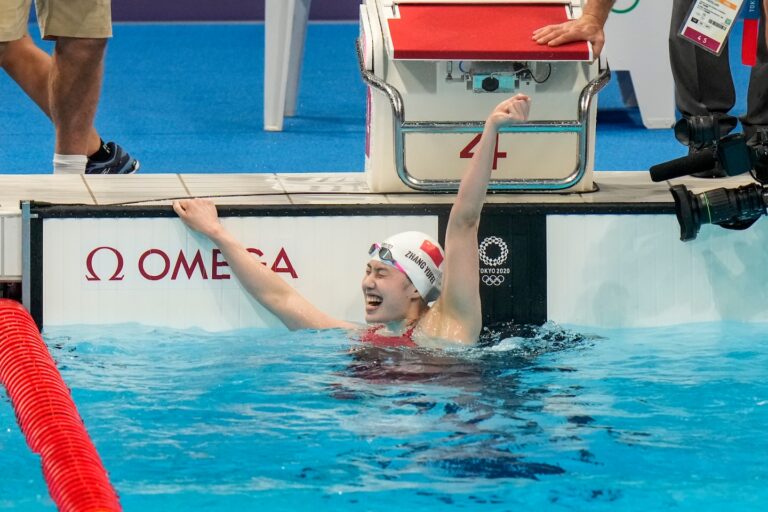But none of the Chinese swimmers were suspended — in fact, 13 competed in Tokyo, and the team won six medals. Despite the World Anti-Doping Agency having its own rules requiring positive tests to be made public, the agency tasked with enforcing anti-doping rules in international sport only acknowledged the positive tests after they had been reported — more than three years after the failed tests.
Since then, even more damning details have emerged: A separate New York Times investigation published last month found that three of the swimmers found to have TMZ in possession in 2021 had also tested positive for another powerful drug, clenbuterol, in 2016 and 2017. Like TMZ, clenbuterol, which acts like an anabolic steroid that promotes muscle growth, is banned and should have been subject to four-year suspensions.
The athletes were again not punished and the incidents were not made public. Two won gold medals in Tokyo and the third went on to become a world record holder. All three, along with eight others who failed tests in 2021, will represent China at this year’s Olympics.
In both cases, WADA accepted the Chinese authorities’ explanation that the positive tests were the result of environmental contamination. In the 2021 case, Chinese authorities alleged that traces of TMZ were found in the kitchen of the hotel where the athletes were staying. They claimed that TMZ had been unknowingly mixed into the athletes’ meals.
There are many problems with this explanation. First, TMZ is a tablet, not a powder or liquid. It is used infrequently, is not included in supplements, and is not given to livestock. So how did the substance get into the kitchen? Furthermore, despite an extensive investigation, none of the kitchen staff or hotel employees were found to have been taking TMZ, and no other guests came forward to say they had been prescribed the drug or had tested positive for it.
WADA denies any wrongdoing and claims that the report it commissioned exonerates the organization. But an appendix to that report shows that two of the organization’s top scientists have expressed skepticism, even incredulity, of the accidental contamination hypothesis. According to the appendix, WADA’s chief scientist Olivier Rabin said in 2021 that he continued to doubt the reality of the contamination described by Chinese authorities, saying that uncertainties about the source of contamination made it “almost impossible to design a realistic scenario.” Associate scientist Irene Mazzoni similarly said, “The doses found in the kitchen were so tiny that it is difficult to believe in contamination.” (When asked about this, a WADA spokesman responded with a new quote that clearly contradicted Rabin and Mazzoni’s earlier statements. “We have no evidence to refute the contamination scenario,” he said.)
Another possible explanation for the multiple positive tests goes unmentioned: systematic doping among China’s Olympic athletes, which the Chinese government is keen to cover up.
This is not without precedent. In 1994, seven Chinese swimmers tested positive for steroids at the Asian Games in Hiroshima. In 1998, Australian customs officials found that Chinese swimmers competing in the world championships in Perth had 13 vials of human growth hormone in their luggage; four Chinese swimmers failed doping tests at that tournament. Later, a former doctor for China’s Olympic athletes revealed that top athletes were routinely subjected to state-sponsored doping in the 1980s and ’90s.
As recently as 2016, The Times of London investigated whistleblower claims that Chinese authorities had tried to cover up failed tests ahead of that year’s Rio Olympics. The paper also reported that a Chinese head coach who had been banned for life for giving steroids, diuretics and other drugs to teenage swimmers was again working with Chinese swimmers. Shortly after the report, Chinese authorities acknowledged that six of the country’s swimmers had tested positive for banned substances in 2015, including three cases involving clenbuterol.
At the very least, given China’s checkered history, the questionable situation, and the significant geopolitical implications, WADA should have followed its own rules and suspended the athletes for 2021 pending the conclusion of its investigation and publicly announced the failed tests. Instead, WADA president Witold Banka reversed course, saying in a recent press conference that “if I had to do it over again, I would do exactly the same thing.”
Fortunately, the Department of Justice and the FBI have opened criminal investigations into its handling of doping allegations, and the Biden administration and a bipartisan coalition of lawmakers are also considering measures to hold WADA accountable for failing in its role as the global adjudicating body for clean sport.
Unfortunately, all these measures will come too late for the athletes in Paris, who will have to compete without knowing whether those around them are unfairly benefiting from performance-enhancing substances.
What is your most memorable memory from a past Olympic competition? Share your answers with us.

